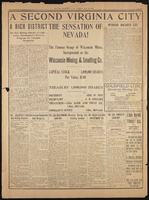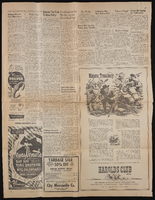Search the Special Collections and Archives Portal
Search Results

Transcript of interview with Mary Ellen Osborn Lake by Fred Wilson, February 18, 1951
Date
Archival Collection
Description
On February 18, 1951, Fred Wilson interviewed Mary Ellen Osborn Lake (born 1870 in Mercer County, Missouri) and her son, Thomas Lake (born 1889 in Missouri). Wilson first asked Mary Ellen questions about when she first arrived in Las Vegas, Nevada in 1904. Much of the relatively brief interview involved questions related to the first Methodist churches in Las Vegas and the Lakes’ involvement and recollections of the locations and members of the church community.
Text
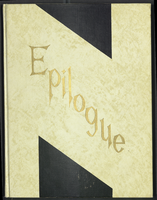
Epilogue: Nevada Southern University Yearbook, 1959
Date
Description
Yearbook main highlights: schools and departments; detailed lists with names and headshots of faculty, administration and students; variety of photos from activities, festivals, campus life, and buildings; campus organizations such as sororities, fraternities and councils; beauty contest winners; college sports and featured athletes; and printed advertisements of local businesses; Institution name: Nevada Southern University, Las Vegas, NV
Mixed Content

Transcript of interview with Pamela Hicks by Elaine Broniecki, February 16, 1979
Date
Archival Collection
Description
On February 16, 1979, collector Elaine Broniecki, interviewed local Clark County School District teacher, Pamela Calos Hicks, (born in Dayton, Ohio, on November 23rd, 1946) in her home in Las Vegas, Nevada. This interview covers Hicks’ recollections of Las Vegas from 1955 to 1979. Hicks’ also lists the addresses of where she has lived within Las Vegas.
Text
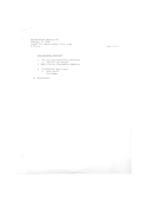
Meeting minutes for Consolidated Student Senate, University of Nevada, Las Vegas, February 21, 1978
Date
Archival Collection
Description
Text
Dorothy Dorothy Photograph Collection
Identifier
Abstract
The Dorothy Dorothy Photograph Collection (approximately 1910-1985) consists of black-and-white photographic prints and negatives as well as colored transparencies of Dorothy Dorothy. Included are photographs of campaigns, meetings, and banquets with various local and federal politicians. Also included are photographs of her husband, Dale Dorothy, and their ranch in Pahrump, Nevada.
Archival Collection
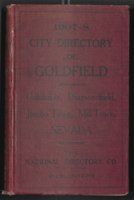
Directory of the city of Goldfield: Columbia, Diamondfield, Jumbo Town, Mill Town Nevada, 1907-1908
Date
Description
A classified business and residence directory, containing short history of Goldfield and the State of Nevada a list of business interests, mining, commercial etc., etc., statistics, and other valuable information for the public
Text
Ida Brewington Pittman Photographs
Identifier
Abstract
The Ida Brewington Pittman Photographs contain photographs of Ida Brewington Pittman and her husband, Nevada Governor Vail Pittman, from 1896 to 1976. The photographs primarily depict Governor Pittman at political events, parades, celebrations, and events. The photographs include Governor Pittman meeting with politicians like President Harry S. Truman, U.S. Senator from Nevada Pat McCarran, Las Vegas, Nevada mayor Ernie Cragin, California Governor Earl Warren, Utah Governor J. Bracken Lee, Oregon Governor Earl Snell, and Wyoming Governor Lester C. Hunt. The photographs also depict the Pittman and Brewington families, the Governor’s Mansion in Carson City, Nevada, the Pittman home in Ely, Nevada, and the Pittmans travelling in other countries.
Archival Collection
Dorothy Dorothy Papers
Identifier
Abstract
The Dorothy Dorothy papers (approximately 1913-1986) document the life of singer, songwriter, columnist, pilot, and farmer, Dorothy Dorothy. Materials contain genealogy records, correspondence, business and organizational records, local history, sheet music, artifacts, and two boxes of photographic prints. Also included are materials relating to her active involvement with animal rights campaigns.
Archival Collection

